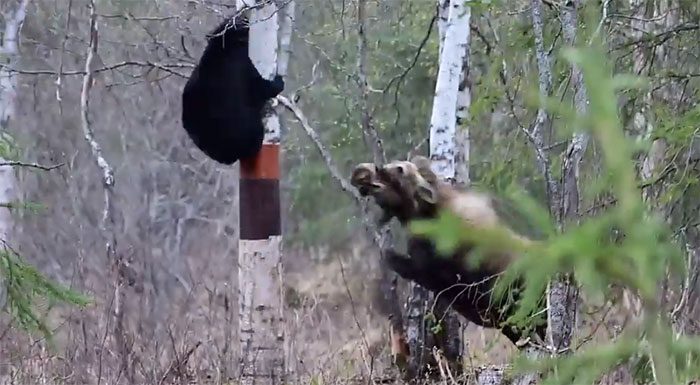The hungry black bear wants to catch one of the two young moose but continually fails due to the fierce defense of their mother.
A resident recorded the encounter between a mother and her young moose (Alces alces) and a black bear (Ursus americanus) near the city of Anchorage, Alaska, USA, and shared it online on June 29. The footage shows the black bear attempting to catch one of the young moose but being fiercely thwarted by their mother, often having to escape up a tree.
In North America, both black bears and grizzly bears can become formidable predators of young ungulates in spring and early summer, according to American naturalist Ethan Shaw. The young of white-tailed deer, elk, bison, or reindeer are particularly vulnerable to a hungry bear. Bears may search through tall grasses and thickets if they suspect a lone calf is hiding there or charge into a herd of elk hoping to isolate a young one that may have fallen behind.

The black bear is fiercely thwarted by the mother moose and often has to escape up a tree.
While deer and elk typically do not vigorously protect their young from bears (though there are exceptions), moose are different. They are not only the largest members of the deer family but also among the most aggressive species.
According to Shaw, an angry moose cornered is one of the most dangerous animals one can encounter in the forests and mountainous regions of northern North America and the Eurasian continent. In Alaska, they even injure more people than bears do.
Bears—both large North American grizzlies and smaller black bears—often face significant challenges when attempting to prey on young moose. However, sometimes predators do succeed. Last year, a North American grizzly bear in Glacier National Park, Montana, killed a young moose.
Black bears are omnivores, meaning they eat both plants and animals. Shaw notes that ungulates provide an energy boost for bears as they navigate through the difficult spring period or when raising two or three cubs. This predatory behavior also helps keep ungulate populations in check.


















































